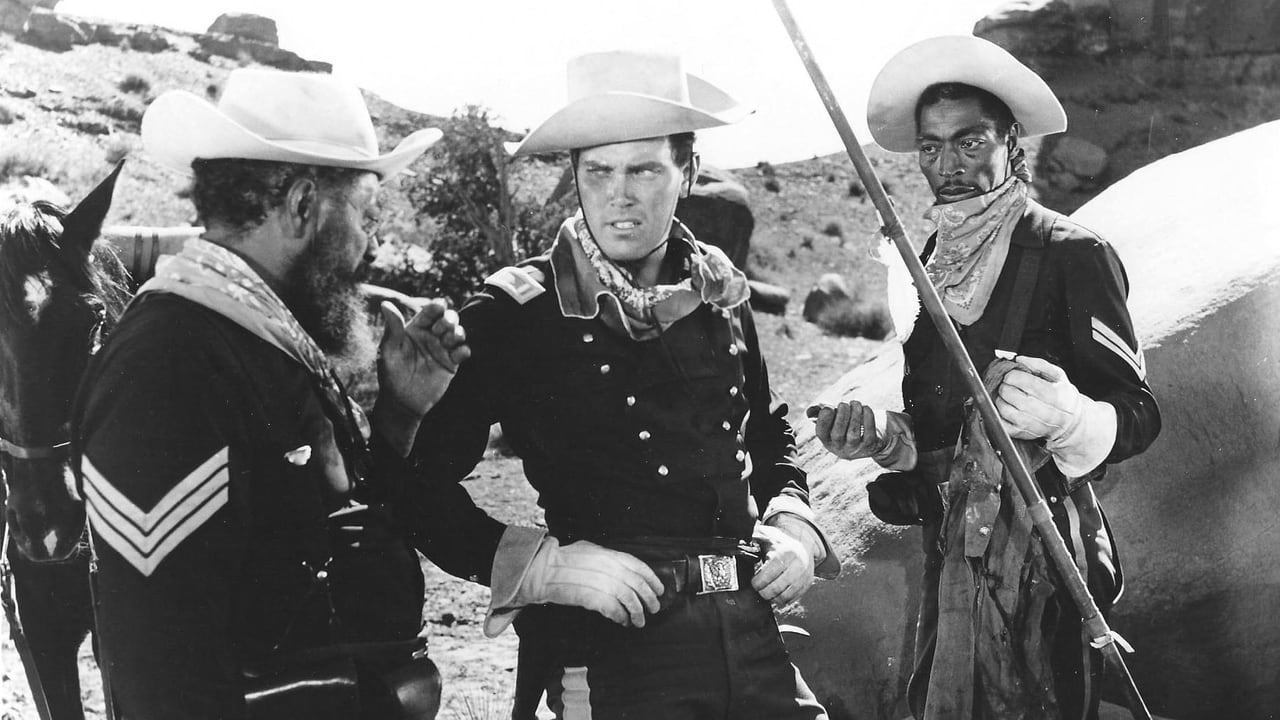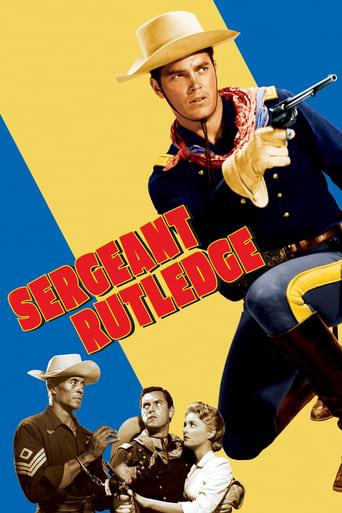

Having seen the picture again last night but this time in HD, I'd just like to say that in my opinion, it has to be the finest cavalry picture ever filmed. The movement of the actors on the horses, the motion of the troop riding across the scenery, even the positions taken of the troop in the background as the dialogue unfolds is impressive. At most there were less than 20 horsemen in one scene, but the actions portrayed the effect of an entire company of horse soldiers. There are too many layers in this picture for me to comment on but I always enjoy watching it when it comes on the telly. A close second in cavalry films would have to be Mssrs. Ford & Waynes Horse Soldiers. But even though there were more actors to fill the scenes, I'd still give Sgt. Rutledge the high mark. Long may he live!
... View MoreWith most of America enthralled with Raymond Burr as "Perry Mason" on TV and Harper Lee's "To Kill a Mockingbird" about to be released, director John Ford was at least ahead of the curve, even this late in his career. "Sergeant Rutledge" places the now-familiar trial of the noble Black man accused of raping a White woman in Mr. Ford's western setting. And, set in Monument Valley, to boot. The timely story has some problems, but should be appreciated for its effort.First of all, the title presumes the picture to be about "Sergeant Rutledge" (Woody Strode), who couldn't have been familiar to the vast majority of filmgoers - so, the more symbolically representative "Captain Buffalo" would have been a preferable title. And, it often seems like the title character is more like a prop, with romantic defenders Jeffrey Hunter (as Tom Cantrell) and Constance Towers (as Mary Beecher) taking center stage. Finally, the courtroom and location flashbacks aren't juxtaposed well, until the exciting climaxes. Watch for fluttering Billie Burke (as Cordelia) in her last featured role.Also, Ford "extra" Mae Marsh (as Nellie) gets a relatively good amount of screen time playing (obviously) a fluttery friend of Billie Burke. Ford, and many members of his troupe, absolutely recalled Ms. Marsh's courtroom appearance in D.W. Griffith's "Intolerance" (1916) - once upon a time, it was considered one of the most memorable moments in film. So, to have Marsh bracketing two great directors' attempts to redress past racist images is grand ironic counterpoint.****** Sergeant Rutledge (5/18/60) John Ford ~ Woody Strode, Jeffrey Hunter, Constance Towers, Billie Burke
... View MoreI wonder which movie the other reviewers saw because the "Seargeant Rutledge" I watched was so bad it was good. Everyone involved with this waste of film should be embarrassed red. Talk about a clinic on weak writing and bad acting. My family was rolling around the floor laughing at the clumsy attempts at drama that came off cornier than anything ol' frozen Walt Disney ever dreamed up. I liked Woody Strode in "Spartacus" and was intrigued by his background as an athlete, so that's why I gave "Seargeant Rutledge" a shot. What a mistake. Where to start? The writing was laughably pathetic and trite, the actors artlessly overdo the cliché drama, and the songs ("Captain Buffalo," for example) are something my kids will be laughing about for years. I can't believe John Ford directed this wreck. I hope he was really off drinking with Sam Peckinpah and maybe this mess was actually an Ed Wood project. Living up to his first name, Strode appears wooden throughout but what a physique! Woody's pecs and biceps and the beautiful shots of Monument Valley all make for nice scenery. But that was it as far as this movie's assets. As for the bad acting, it was close but I'll have to go with Willis Bouchey as the worst of the bunch for his completely amateurish and inept mishandling of the role of Otis Fosgate, who presides over Rutledge's trial. Honorable mention to Jeffrey Hunter, Constance Towers, Billie Burke and Judson Pratt for mangling their parts. Carleton Young actually isn't too bad as the prosecutor, but he, like the rest, has to read and deliver his lines off a script that stinks to high heaven. The sexist scenes of the treatment of the women at the trial is beneath contempt but the confession scene at the end of the trial as well as the very final closing scene with Hunter,Towers and the black soldiers are really the twin icings on this mudcake. Just terrible. An accidental comedy.
... View MoreUp to now I have considered "The Searchers" the Best of Ford Westerns. It has better picture (VistaVision), and the legend of John Wayne to back it. Some of the secondary roles are better portrayed by more expert actors such as Ward Bond, just to mention one. Production is more lavish..But the plot in "The Searchers" is unidirectional. It's just a story of white settlers against Indians. Sergeant Rutledge goes much deeper, into the social "fabric" of America,To avoid fastidious repetition, let me just point that the story goes into "American Problems" that endure 100 years after. Racism, young female behavior, that affects men of power, and old rich females who own perhaps more than 50% of the total assets (the wealth of the Nation) of the USA, and last but not least, the excessive power and "tricks" of legal professionals that always leads to corruption.It is all there. If the actors were a bit upper-crust it would be the best, but Jack Warner did no provide the cash. A must see...
... View More